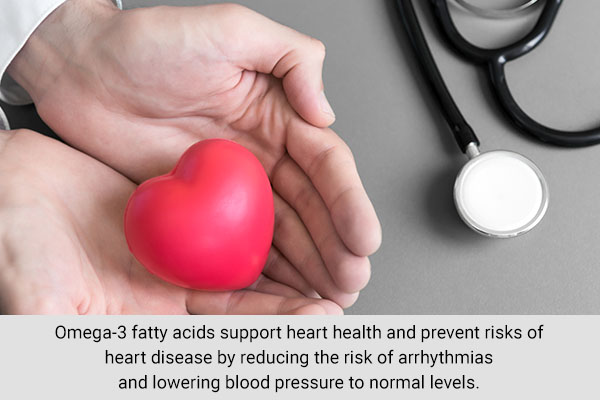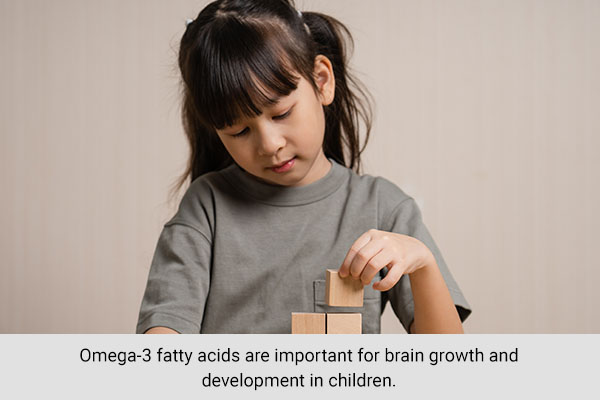In this article:
Omega-3 fatty acids (also called omega-3 fats and n-3 fats) are essential fats that cannot be produced by your body in sufficient amounts and therefore must be consumed via the diet. Omega-3 fatty acids can be obtained from plant and animal sources.

There are three types of omega-3 fatty acids:
- Alpha-linolenic acid (ALA)
- Eicosapentaenoic acid (EPA)
- Docosahexaenoic acid (DHA)
Omega-3 fatty acids assist all the cells in your body to function properly. They’re a crucial component of your cell membranes as they provide structural integrity and sustain interactions among cells. Also, omega-3 fatty acids equip your body with energy and aid many of the bodily systems. (1)
Health Benefits of Omega-3 Fatty Acids
Omega-3 fatty acids benefit the body in the following ways.
1. Promotes heart health

Omega-3 fatty acids support heart health and prevent risks of heart disease by reducing the risk of arrhythmias and lowering blood pressure to normal levels.
The same is proven by a study published in the American Journal of Clinical Nutrition, which suggests that omega-3 fatty acids have beneficial effects on coronary heart disease. (2)
Another study reported that increasing the intake of fish as a source of omega-3 fatty acids increases the levels of high-density lipoproteins or good cholesterol. (3)
Not only this, but according to a 2015 study published in Circulation, consumption of omega-3 fatty acids may reduce the risk of death from heart disease. It also decreases body fat levels and maintains healthy blood pressure. (4)
2. Fights depression
Omega-3 fatty acids can help in the fight against mental health issues such as depression and anxiety, notably reducing the symptoms of depression such as fatigue, nervousness, and sadness.
According to a study published in Lipids Health and Disease, there is enough evidence to conclude the role of omega-3 fatty acids in the treatment of depression. (5)
Another study from CNS Neuroscience Therapeutics reported that omega-3 fatty acids are very effective for the treatment of depression in both adults and children. (6)
The same was suggested in a research published in European Neuropsychopharmacology that shared how omega-3 fatty acids are a good adjunctive treatment in mild to moderate depression. (7)
3. Helps in maintaining skin health

Omega-3 fatty acids have been demonstrated to be beneficial for promoting skin homeostasis and reducing skin abnormalities. Studies have shown that omega-3 fatty acids can be great for: (8)
- Improving skin barrier function
- Preventing UV-induced inflammation
- Fighting hyperpigmentation
- Improving dry skin and pruritus
- Accelerating wound healing
- Preventing skin cancer
Omega-3 fatty acids for skin health can be administered through various routes such as:
- Oral supplementation
- Topical application
- Intravenous injection
4. Aids in hair growth
Some research done to study the effects of omega-3 fatty acids on hair growth concluded that omega-3 fatty acids may be a good way of promoting hair growth and reducing hair loss.
One such study is published in the Journal of Clinical and Aesthetic Dermatology, where patients with androgenetic alopecia were each given a twice-daily supplement rich in omega-3 fatty acids. After roughly 6 months, the majority of the patients had an increase in hair growth. (9)
5. Rehydrates parched nails
Dermatologists suggest that massaging your nails with some fish oil, which is high in omega-3 fatty acids, is great for fighting dry, peeling, and painful cuticles. They advise the use of fish oil directly on the skin around the nails to rehydrate them and help keep the skin moisturized.
ALSO READ: 10 Best Foods for Strong and Healthy Nails
6. Promotes brain health in children

Omega-3 fatty acids are important for brain growth and development in children. A study reported that taking omega-3 fatty acids supplements during pregnancy has a positive influence on the child’s IQ. (10)
Another study from the Indian Journal of Pediatrics reported that the intake of omega-3 fatty acids in children prevents the risk of ADHD and results in the development of learning capability while improvement of academic performance. (11)
7. Fights inflammation
Fighting inflammation is important for controlling the risk of heart issues, cancer, and other diseases. This can be made possible by consuming a sufficient amount of omega-3 fatty acids.
A study published in the Journal of the American College of Nutrition stated that omega-3 fatty acids have a positive influence in controlling inflammation. (12)
Another study shared that omega-3 fatty acids play a role in the modulation of inflammatory processes and thereby stop the progression of atherosclerosis, which is responsible for heart diseases. (13)
8. Improves sleep
Omega-3 fatty acids play a role in enhancing the secretion of melatonin, which helps in the regulation of the circadian rhythm or the sleep-wake cycle. This is shared by a study published in Food & Nutrition Research, which reports that fatty acid status influences melatonin synthesis. (14)
9. May help prevent cancer
Omega-3 fatty acids help reduce cancer risk as consuming sufficient amounts of omega-3 fatty acids lower the incidences of breast cancer and colon cancer. This is according to a study published in the American Journal of Epidemiology. (15)
The same was confirmed by research shared in the European Journal of Cancer Prevention, which suggested a connection between increased consumption of n-3 fatty acids and a reduced risk of colorectal cancer. (16)
Recommended Dosage of Omega-3 Fatty Acids
The recommended dietary allowance (RDA) of omega-3 fatty acids is:
- 1.6 g/day for adult men
- 1.1 g/day for adult women
- 1.4 g/day for pregnant women (17)
How to Get Enough Omega-3 Fatty Acids Through the Diet

Omega-3 fatty acid deficiency can be solved with an improved diet. You can get the recommended amounts of omega-3 fatty acids by consuming the following: (18)(19)
- Salmon
- Mackerel
- Herring
- Tuna
- Anchovy
- Bluefish
- Sea bass
- Walnuts
- Chia seeds
- Flaxseeds
- Soy foods
- Canola oil
Vegetarians: Getting Sufficient Omega-3 Fatty Acids
Experts explain how the best sources of omega-3 fats are fatty fish, such as salmon, tuna, and trout, which are not included in vegetarian diets. Thus, it’s important that vegetarians add plant sources of omega-3 fatty acids to their diet such as:
- Chia
- Flax
- Hemp seeds
- Walnuts
- Canola oil
Most-Asked Questions About Omega-3 Fatty Acids
Why are omega-3 fatty acids important for the body?

Omega-3 fatty acids are an important part of your cell membranes and affect the functioning of the receptors in these membranes. They are also involved in making hormones that are responsible for blood clotting, arterial relaxation, and inflammatory response. (1)
What diseases can be prevented by sufficient intake of omega-3 fatty acids?
Due to the various beneficial effects of omega-3 fatty acids, they help prevent:
- Heart disease
- Stroke
- Lupus
- Eczema
- Rheumatoid arthritis
- Cancer
How much fish should I eat to get sufficient amounts of omega-3 fatty acids?
Eating fish and other seafood once or twice every week is important to get the benefits of marine omega-3 fatty acids. (1)
Final Word
Omega-3 fatty acids are a group of polyunsaturated fatty acids that are required in the body for regulating many functions. They provide a ton of health benefits such as preventing heart diseases and autoimmune disorders. They also benefit brain development in children.
Thus, consuming sufficient amounts of omega-3 fatty acids by eating foods such as fish and flaxseeds is immensely important.
- Was this article helpful?
- YES, THANKS!NOT REALLY


